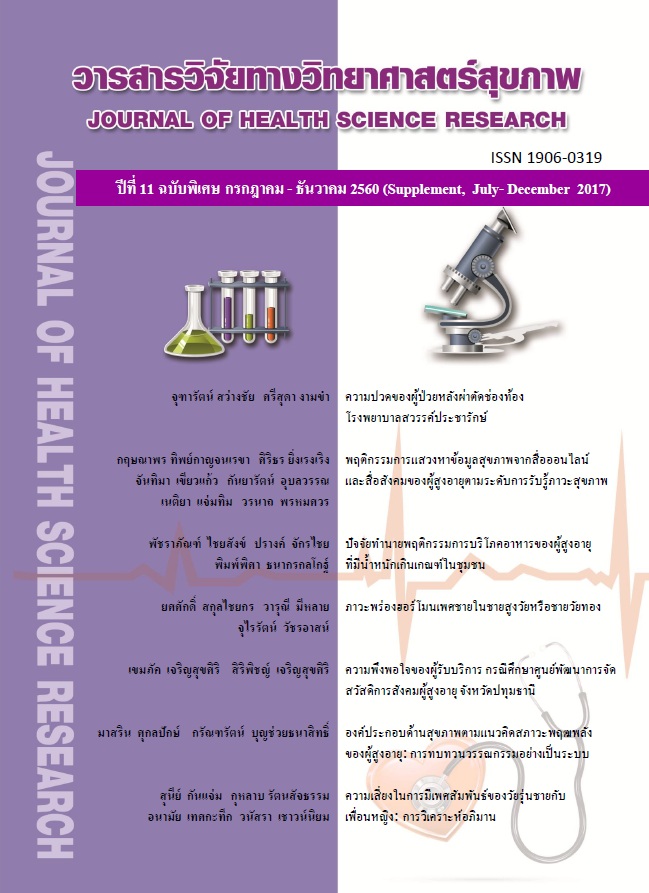พฤติกรรมการแสวงหาข้อมูลสุขภาพจากสื่อออนไลน์และสื่อสังคมของผู้สูงอายุตามระดับการรับรู้ภาวะสุขภาพ
Main Article Content
บทคัดย่อ
บทคัดย่อ
การวิจัยนี้ศึกษาพฤติกรรมการแสวงหาข้อมูลสุขภาพผ่านสื่อออนไลน์และสื่อสังคมของผู้สูงอายุจำแนกตามการรับรู้ภาวะสุขภาพตนเอง กลุ่มตัวอย่างจำนวน 1,269 คน ได้มาโดยการสุ่มตามสัดส่วนประชากรผู้สูงอายุทั่วทุกภูมิภาค รวบรวมข้อมูลโดยใช้แบบสอบถามระหว่างเดือนกรกฎาคม - ธันวาคม 2559 ผลการศึกษาพบว่าผู้สูงอายุโดยรวมรับรู้ภาวะสุขภาพตนเองว่า อยู่ในระดับดี (= 7.18, SD= 1.13) มีการแสวงหาข้อมูลสุขภาพผ่านสื่อออนไลน์/สื่อสังคมอยู่ในระดับต่ำ (คะแนนเฉลี่ย= 0.50, SD= 0.76) ประเด็นข้อมูลสุขภาพที่ทำการสืบค้นบ่อยใน 3 ลำดับแรก ได้แก่ แบบแผนการใช้ชีวิตเพื่อการมีสุขภาพดี ร้อยละ 6.40 การรักษาโรค ร้อยละ 6.30 และข้อมูลการใช้ยา ร้อยละ 6.20 การเปรียบเทียบการแสวงหาข้อมูลสุขภาพจากสื่อออนไลน์/ สื่อสังคมจำแนกตามระดับการรับรู้ภาวะสุขภาพพบความแตกต่างอย่างมีนัยสำคัญ (χ2(2) = 41.57, p < .01) การแสวงหาข้อมูลสุขภาพจากสื่อออนไลน์/สื่อสังคมในกลุ่มผู้สูงอายุที่สุขภาพไม่ดี (ค่า mean rank เท่ากับ 593.38) กลุ่มผู้สูงอายุที่สุขภาพปานกลาง ค่า mean rank เท่ากับ 575.48 และกลุ่มผู้สูงอายุที่สุขภาพดี (ค่า mean rank เท่ากับ 694.71) พบว่ากลุ่มผู้สูงอายุที่สุขภาพดีแสวงหาข้อมูลสุขภาพจากสื่อออนไลน์/สื่อสังคมสูงกว่ากลุ่มผู้สูงอายุที่มีภาวะสุขภาพปานกลางอย่างมีนัยสำคัญ ค่า Mann-Whitney U เท่ากับ 150538.5 (Z= -6.40, p < 0.01) และพบว่าขนาดอิทธิพลของการรับรู้ภาวะสุขภาพต่อการแสวงหาข้อมูลสุขภาพจาก สื่อออนไลน์/ สื่อสังคมของผู้สูงอายุจัดอยู่ในระดับน้อย (r= -.18) หน่วยงานที่มีหน้าที่เกี่ยวข้องกับผู้สูงอายุควรส่งเสริมความสามารถเข้าถึงข้อมูลความรู้สุขภาพผ่านสื่อออนไลน์/ สื่อสังคมและการนำข้อมูลไปใช้ได้อย่างเต็มประสิทธิภาพ
Abstract
This study investigated health information seeking behaviors through online media of elderly regarding their perceived health status. The 1,269 samples were randomized from proportion of elderly population across regions. Data were collected from July to December 2016 using questionnaires. Results showed that the overall perceived health status of elderly was at a good level (= 7.56, SD= 1.4); whereas health information seeking behaviors through online media was at a low level (mean= 0.50, SD= 0.76). The top three health topics searched were healthy lifestyle (6.40%), illness treatment (6.30%), and medication use (6.20%). Regarding the actual health status there were significantly different in groups seeking information (χ2(2) = 41.57, p <.01), elderly with poor health (mean rank= 593.38), moderate health (mean rank= 575.48), and good health (mean rank= 694.71). Post-hoc comparison revealed that elderly who perceived having good health used online media more frequent than those who perceived having moderate health, Mann-Whitney U was 150538.5 (Z= -6.40), p < 0.01). The effect size of perceived health status on health information seeking behaviors was small (r = -.18). This study suggests integrating tasks among responsible organizations on promoting the accessibility on health information through online media and the effective usage of elderly.

